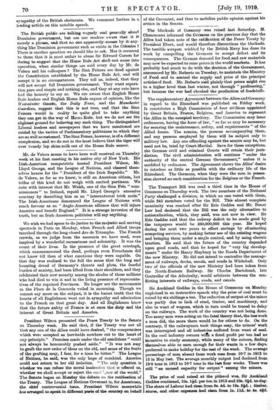Sir Auckland Geddes in the House of Commons on Monday
explained in an instructive speech why the price of coal must be raised by six shillings a ton. The reduction of output at the mines was partly due to lack of steel, timber, and machinery, and also to want of wagons, which in turn could be traced to delay on the railways. The work of the country was not being done. Too many men were acting on the fatal theory that, the less work a man did, the more there would be for others to do. On the contrary, if the railway-men took things easy, the miners' work was interrupted and all industries suffered from want of coal. In the coal industry owners with a fixed profit per ton had no incentive to study economy, while many of the miners, finding themselves able to earn enough for their wants in a few due, preferred to make holiday for the rest of the week. The average percentage of men absent from work rose from 10.7 in 1913 to 13 in May last. The average monthly output had declined from 19.8 tons in 1913 to 16.7 tons in the last four weeks. There was still " an unused capacity for output " among the miners.


































 Previous page
Previous page